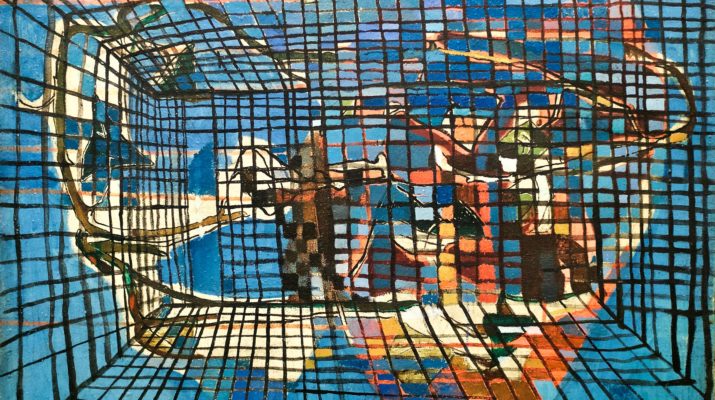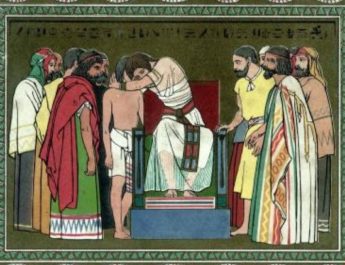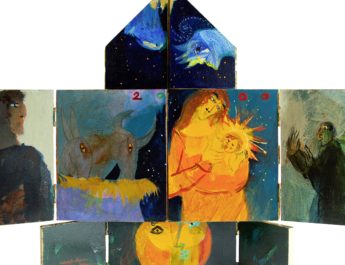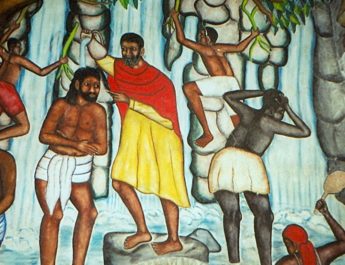Psalm 108
A “song” = shir. From shir (to sing; one who is singing or leading others in song). This is song or singer.
B “psalm” = mizmor. From zamar (making music; used specially of music to worship God; music with singing, singing praise, singing psalms); may be from zamar (to trim or prune). This is a melody or a psalm.
C “David” = David. From the same as dod (beloved, love, uncle); the root may mean to boil, which is used figuratively to describe love. So, this implies someone you love such as a friend, a lover, or a close family member like an uncle. David’s name likely means something like “beloved one.”
1 My heartD is steadfast,E O God,F my heart is steadfast;
I will singG and make melody.H
Awake,I my soul!J
D “heart” = leb. May be related to labab (to encourage; properly, to be encased as with fat; used in a good sense, this means to transport someone with love; used in a bad sense, it can mean to dull one’s senses). This is the heart, courage, one’s inner self, the mind, or the will. Heart is only used in a figurative sense in the Old and New Testaments.
E “is steadfast” = kun. Properly, this means in a perpendicular position. So, it is set up in a literal sense – establish, fix, fasten, prepare. In a figurative sense, it is certainty, to be firm, faithfulness, render sure or prosperous.
F “God” = Elohim.
G “sing” = shir. Related to “song” in superscript. See note A above.
H “make melody” = zamar. Related to “psalm” in superscript. See note B above.
I “awake” = aph. This is also, furthermore, even.
J “soul” = kabod. From kabad (to be heavy, weighty, burdensome). This is weighty. Figuratively, glorious, abundant, riches, honor, splendor – a reference to one’s reputation or character. This word is often used to describe God and God’s presence.
2 Awake,K O harpL and lyre!M
I will awakeN the dawn.O
K “awake” = ur. This is to arise, lift, exult, or stir. It is to wake in a literal or figurative sense.
L “harp” = nebel. From nabel (to fall away, faint, wither, languish, sink; figuratively, being senseless, foolish, or wicked; to despise, disgrace, or fall to nothing, to be seen with contempt). This is a vessel, perhaps made of skins for holding liquids. It could be a skin, vase, or lyre as having a similar shape.
M “lyre” = kinnor. Root may be to twang. This is a lyre or harp.
N “awake” = ur. Same as “awake” in v2. See note K above.
O “dawn” = shachar. Root may mean to look for in early hour or in a diligent way. This is dawn, early light, or morning.
3 I will give thanksP to you, O Lord,Q among the peoples,R
and I will sing praisesS to you amongT the nations.U
P “give thanks” = yadah. From yad (hand). This is to throw one’s hands into the air in a gesture of praise. So, it is to praise, give thanks, or make a confession.
Q “Lord” = YHVH. From havah (to be, become) or hayah (to come to pass, become, be). This is the name of the God of Israel, the self-existent and eternal one, the tetragrammaton. This pronunciation has been lost to time so “Lord” is generally used in its place.
R “peoples” = am. From amam (to darken, hide, associate; creating shadows by huddling together). This is people or nation. It can be used specifically for a tribe, collectively of troops or armies, or figuratively to refer to a flock of animals.
S “sing praises” = zamar. Same as “make melody” in v1. See note H above.
T “among” = bal. From balah (to grow old, wear out, consume, waste, enjoy, fail, decay). This is not, lest, neither. Properly, it refers to a failure, so it implies nothing or not at all.
U “nations” = leom. Root may refer to gathering. This is people, a community, or a nation.
4 For your steadfast love is higherV than the heavens,W
and your faithfulnessX reaches to the clouds.Y, Z
V “higher” = gadol. From gadal (to grow up, become great, become wealthy – to advance. The root meaning may be to twist in the sense of the process of growing). This is great, high, bigger, noble, old, marvelous. It can also refer to someone who is powerful or distinguished.
W “heavens” = shamayim. Root may mean being lofty. This is sky, the air, or heaven. It is in a dual noun form so this might refer to the part of the sky where the clouds move on the one hand and the part beyond that where the sun, moon, and stars are on the other hand.
X “faithfulness” = chesed. From chasad (being good, kind, merciful; may mean bowing one’s neck as is done in the presence of an equal for courtesy’s sake; so, if one in a superior position is treating you like an equal, that is what is captured here). This is favor, goodness, kindness, loving kindness, pity, reproach, or a good deed. When done by God to humanity, this is mercy/loving kindness. When done by humanity to God, it is piety.
Y “clouds” = shachaq. From shachaq (to rub off, wear away, pulverize). This is powder, dust, vapor. It can also refer to the sky or a cloud.
Z {untranslated} = emet. From aman (to believe, endure, fulfill, confirm, support, be faithful, put one’s trust in, be steadfast. Figuratively, this is to be firm, steadfast, or faithful, trusting, believing, being permanent, morally solid). This is firmness or stability. Figuratively, it is faithfulness, truth, or trustworthiness. This is the same root that “amen” comes from.
5 Be exalted,AA O God, above the heavens,
and let your gloryBB be over allCC the earth.DD
AA “be exalted” = rum. This is to rise or raise, to be high literally or figuratively. So it can also mean to exalt or extol.
BB “glory” = kabod. Same as “soul” in v1. See note J above.
CC “all” = kol. From kalal (to complete). This is all or every.
DD “earth” = erets. Root may mean to be firm. This is earth, ground, field land, or country.
6 Give victoryEE with your right hand,FF and answerGG me,
so that those whom you loveHH may be rescued.II
EE “give victory” = yasha. To deliver, defend, help, preserve, rescue, be safe. Properly, to be open, wide or free, which implies being safe. Used causatively, it means to free.
FF “right hand” = yamin. May be from yamam (to go or choose the right, use the right hand; to be physically fit or firm). This can mean right hand, right side, or south. Since most people are right-handed, the metaphorical usage of this word presumes that the right hand is stronger and more agile. Thus, it is the instrument of power and action.
GG “answer” = anah. This is answer, respond, announce, sing, shout, or testify. It means to pay attention, which implies responding and, by extension, starting to talk. Used in a specific sense for singing, shouting, testifying, etc.
HH “love” = yadid. Related to “David” in superscript. 9x in OT. Perhaps from the same as dod (see note C above). This is lovely, amiable, beloved.
II “be rescued” = chalats. This is to turn back or away in a literal or figurative sense. So, it could be return, break, build, retreat. It doesn’t necessarily imply going back to the place you started.
7 God has promisedJJ in his sanctuary:KK
“With exultationLL I will divide upMM Shechem,NN
JJ “promised” = dabar. This is generally to speak, answer, declare, or command. It might mean to arrange and so to speak in a figurative sense as arranging words.
KK “sanctuary” = qodesh. This is set apart and so sacred. God is different from us and so God is holy/set apart. Things we dedicate to God’s service are set apart for God and so they, too, are holy, etc.
LL “exultation” = alaz. 16x in OT. This is to jump for joy, rejoice, triumph, or be jubilant.
MM “divide up” = chalaq. This is to be smooth in a figurative sense. So, it can refer to the stones that were part of casting lots – hence, apportion, share, distribute. Figuratively, it can also mean to flatter.
NN “Shechem” = Shekem. From the same as shekem (shoulder, neck, or some other place that bears burdens; figuratively, the spur of a hill, or one’s allotted portion); from shakam (to rise early, begin work early; properly, this is leaning one’s shoulder or back into a load or a burden; also, loading an animal for work). This is Shechem, meaning “ridge.”
and portion outOO the ValePP of Succoth.QQ
OO “portion out” = madad. This is to measure, stretch, be extended, continue.
PP “Vale” = emeq. From amoq (to be deep in a literal or figurative sense; profound). This is Vale or valley – frequently part of place names.
QQ “Succoth” = Sukkot. 18x in OT. From sukkah (booth, canopy, shelter, tent, or tabernacle); from sok (lair, thicket, den, or hiding place; a den or pavilion as made of intertwined boughs); from sakak (to interweave, knit). This is Succoth, perhaps meaning “booths” or “weavings.” It is related to the Jewish holiday “Sukkoth,” the Festival of Booths. See https://www.abarim-publications.com/Meaning/Succoth.html
8 GileadRR is mine; ManassehSS is mine;
EphraimTT is my helmet;UU, VV
JudahWW is my scepter.XX
RR “Gilead” = Gilad. From gala (to lay bare, quarrel, expose) OR from gal’ed (heap of testimony); {from gal (wave, billow, rock pile; something rolled; a spring of water); {from galal (to roll, roll away, wallow, commit, remove; rolling in a literal or figurative sense)} + ed (witness, testimony, recorder); from ud (to admonish, repeat, duplicate, testify, restore, record, relieve)}}. This is Gilead, meaning “perpetual fountain” or “heap of testimony.” See https://www.abarim-publications.com/Meaning/Gilead.html#.Xw_EFShKhPY.
SS “Manasseh” = Menashsheh. From nashah (to forget, neglect, remove, deprive). This is Manasseh, literally “causing to forget.” It is Manasseh, his tribe, or the lands of the tribe.
TT “Ephraim” = Ephrayim. From the same as epher (ashes or dust – properly something strewn) OR from parah (to grow, increase, be fruitful in a literal or figurative sense). This is Ephraim, one of Joseph’s sons, his descendants, and their land.
UU “helmet” = maoz. From uz (to run for refuge, to seek safety, be strong) OR from azaz (to be strong, become fixed, be bold, prevail, be impudent; to be stout literally or figuratively). This is a defense, refuge, safety, fortress, rock, strength, or stronghold. It is somewhere one goes to be safe and protected or something one uses to be safe. Figuratively, it could be a defense or a force.
VV {untranslated} = rosh. Literally, “for my head.” This may come a word that means to shake. It is the head, captain, or chief. It can also be excellent or the forefront. It can be first in position or in statue or in time (i.e. the beginning).
WW “Judah” = Yehudah. Related to “give thanks” in v3. Probably from yadah (see note P above). This is Judah, meaning “praised.”
XX “scepter” = chaqaq. 19x in OT. This is to inscribe, carve, or decree. It can be a lawmaker/commander or a staff/scepter. Literally, this is engraving, but it implies enacting a law because laws were carved into stone or metal.
9 MoabYY is my washbasin;ZZ
on EdomAAA I hurlBBB my shoe;CCC
over PhilistiaDDD I shout in triumph.”EEE
YY “Moab” = Moab. May be from ab (father, ancestor, grandfather; father in a literal or figurative sense). This is Moab or Moabite. Name could mean “from her father” in reference to the incestuous relationship between Lot and his daughters. The name could also mean, more pleasantly, “seed of a father” or “desirable land.” See https://en.wikipedia.org/wiki/Moab
ZZ “washbasin” = siyr + rachats. Siyr is from a root that may mean to boil. So it is a pot or pan. It can also be a thorn because it grows quickly or a hook. Rachats is 2x in OT. From rachats (to wash, bathe – whether entirely or partially). This is a washing or bowl.
AAA “Edom” = Edom. From the same as adom (to be red or flushed). This is Edom or Idumaea. It means red.
BBB “hurl” = shalak. This is to throw, fling, or hurl. It can also be to throw away in a literal or figurative sense.
CCC “shoe” = naal. From naal (properly to secure with a bar or cord; to lock, bolt, enclose; to secure with a cord i.e. to put on a sandal). This is the tongue of a sandal and, by extension, a sandal or shoe itself. Figuratively, this can refer to occupancy, unwillingness to marry, or something without value.
DDD “Philistia” = Peleshet. 8x in OT. From palash (to mourn, wallow, maybe roll in). This is Philistia, which may mean “griever” or “burrower” or “weakener.” See https://www.abarim-publications.com/Meaning/Philistine.html.
EEE “shout in triumph” = rua. To break or destroy something so figuratively, an ear splitting sound such as a call of alarm or a joyful sound.
10 Who will bringFFF me to the fortifiedGGG city?HHH
Who will leadIII me to Edom?
FFF “bring” = yabal. 18x in OT. This is to lead, bring, carry, conduct. Properly, it means to flow. It can mean to bring or lead with fanfare.
GGG “fortified” = mibtsar. From batsar (to enclose, wall up, or make something inaccessible, impenetrable, isolated to fortify, something mighty, to gather grapes). This is fortification, castle, besiege, or defender.
HHH “city” = iyr. Related to “awake” in v2. From ur (see note K above). This can mean excitement in the sense of wakefulness or city. Properly, this is a place that is guarded. Guards kept schedules according to watches. This sense of the word would include cities as well as encampments or posts that were guarded.
III “lead” = nachah. This is lead, guide, or bring. It can be used for transporting into exile or coming in as colonists. This is the word used in Psalm 23 “he leads me in the paths of righteousness.”
11 Have you not rejectedJJJ us, O God?
You do not go out,KKK O God, with our armies.LLL
12 O grantMMM us helpNNN against the foe,OOO
JJJ “rejected” = zanach. This is to cast aside, reject, remove, forsake.
KKK “go out” = yatsa. This is to go or come out, bring forth, appear. It is to go out in a literal or figurative sense.
LLL “armies” = tsaba. From tsaba (to wage war, serve, assemble, fight, perform, muster, wait on). This is a large group of persons (used figuratively for a group of things). It implies a campaign literally as with army, war, warfare, battle, company, soldiers. Can also be used figuratively for hardship or for worship.
MMM “grant” = yahab. This is give, put, bring, take. It is to give in a literal or figurative sense.
NNN “help” = ezrah. From ezer (help, aid, helper); from azar (to help, protect, support, ally; properly, to surround so as to provide aid). This is help, helper, support.
OOO “foe” = tsar. From tsarar (to bind, restrict, narrow, be cramped, an adversary). Properly, this is a narrow or constricted place. Figuratively, it can be trouble, a pebble, an enemy, anguish, or distress.
for humanPPP helpQQQ is worthless.RRR
13 With God we shall doSSS valiantly;TTT
it is he who will tread downUUU our foes.
PPP “human” = adam. Perhaps from adam (to be red, make ruddy); related to adamah (ground, dirt, earth). This is man, humankind, also Adam’s name. It refers to a human individual or humanity.
QQQ “help” = teshuah. Related to “give victory” in v6. From yasha (see note EE above). This is deliverance or salvation.
RRR “worthless” = shav. Perhaps from the same as sho (ruin, desolation, storm; from a root that means rushing over – hence a storm and hence devastation). This is emptiness, false, worthless, deceit. It can also refer to evil, guile, idolatry, or something being in vain.
SSS “do” = asah. This is to make, do, act, appoint, become in many senses.
TTT “valiantly” = chayil. From chul (to be firm, strong, prosperous; to endure). This is strength, wealth, ability, activity. It can refer to soldier or a company of soldiers as well as goods. It is a force of people, means, or goods. It can speak of valor, virtue, or strength.
UUU “tread down” = bus. 12x in OT. This is to trample, tread down, squirm, loathe, spurn, be polluted. It can be literal or figurative.
Image credit: “The Hero or the Herald” by Vieira da Silva. Photo by Pedro Ribeiro Simões, 2019.




